Artículo
El personal docente cumple un rol clave en la prevención de la violencia de género (VG) en el ámbito educativo. Este trabajo tiene como objetivo validar al contexto local dos escalas para indagar cómo el personal docente y directivo valoran los obstáculos para abordar la VG y conocer su valoración respecto a las medidas propuestas para mejorar la prevención y la forma de abordarla. Se realizó un estudio descriptivo, transversal y multicéntrico con personal docente y directivo de escuelas públicas de Córdoba, Argentina. Para ello, se utilizó un cuestionario autoadministrado que incluyó dos escalas, una sobre obstáculos y otra sobre medidas. Se realizó análisis descriptivo, bivariante, factorial exploratorio y alfa de Cronbach y se construyó un modelo de regresión múltiple utilizando cada factor como variable dependiente. La escala validada de obstáculos se compone de diez preguntas y la escala de medidas incluye trece. Los resultados de regresión múltiple indican que los vínculos y prejuicios funcionan como obstáculos importantes para el nivel primario. La importancia otorgada a la ayuda especializada, como medida para prevenir la VG, se asocia a los equipos educativos que han manifestado necesidad de formación en este tema. Quienes han realizado actividades de prevención en las escuelas de nivel primario valoran más la transversalización de la perspectiva de género como medida. Las escuelas con personal en situación de VG consideran la formación en VG como medida de gran relevancia. Las escalas validadas en este estudio son fiables y recogen dimensiones empíricas de las valoraciones sobre obstáculos y medidas en relación con el abordaje de la VG en las escuelas. Teachers play a key role in the prevention of gender violence (GBV) in the educationalfield. However, studies evaluating the opinionsof teaching and management staff regardingthe necessary measures to prevent GBV or theobstacles they must face when addressing thisproblem in the educational field in our contextare incipient. This work aims to validate twoscales to know the opinions and evaluationsof the educational personnel on the obstaclesand the measures they consider necessary to tackle and prevent GBV in schools. A descriptive,cross-sectional and multicenter studywas carried out to an intentional non-probabilitysampling. The study population wasthe directing and teaching staff of schoolsin the Province of Córdoba, Argentina. Thestudy variables were: sex, years of experiencein the position, age, educational level of thecenter (initial / primary / middle / tertiary),area (urban / rural), locality where the faceto-face training was carried out, preventionactivities carried out in the educational centerfocused on: students, families, and the educationalteam; GBV training activities carriedout by the educational team, women and/orfamilies identified in GBV situation, familieswith judicial restraining order, team interventionseducation before GBV of the studentsand/or families, staff of the educational teamthat has lived or is experiencing a situationof GBV, meetings of the educational teamwith local community organizations to articulateactivity to prevent and/or address GBV,need for training on GBV manifested by theteaching team. To measure opinions on theobstacles and measures necessary to addressGBV in schools, we applied a self-administeredquestionnaire with two scales, one onobstacles and the other on measures, based onSpanish scales. A descriptive, bivariate analysisof the relationship of all variables withsex, exploratory factor and Cronbach’s alphawas performed. Finally, a multiple regressionmodel was constructed to test the convergentvalidity using each factor as the dependentvariable. The first scale of ten itemsidentifies a dimension of obstacles relatedto family ties and existing prejudices in theeducational community. The second dimension,values aspects related to the scarcityof resources. For its part, the thirteen itemscale of measurements has three dimensions.The first dimension, groups measures relatedto specialized help to address GBV, such asprevention programs, materials, and coordinationwith external organizations. The secondgroups the measures related to the need to have gender mainstreaming measures in theapproach to GBV at school. The third dimensionreflects the importance of staff trainingon these topics. Bonds and biases function asmajor obstacles for the elementary level. Theimportance given to specialized help, as ameasure to prevent GBV, is mainly associatedwith educational teams that have expressed aneed for training in this area. Those who havecarried out prevention activities and primaryschools, value more the mainstreaming ofthe gender perspective as a measure. Schoolswith staff who have lived or are experiencinga GBV situation consider GBV training as ahighly relevant measure. The scales validatedin this study are reliable and include empiricaldimensions of the assessments of obstaclesand measures in relation to the GBV approachin schools.
Elaboración de escalas de valoración de obstáculos y medidas para abordar la violencia de género en las escuelas
Título:
Development of scales to study barriers and needed measures to address gender-based violence in schools
Fecha de publicación:
01/2022
Editorial:
Centro Interamericano de Investigaciones Psicologicas y Ciencias Afines
Revista:
Interdisciplinaria
ISSN:
1853-1679
e-ISSN:
1668-7027
Idioma:
Español
Tipo de recurso:
Artículo publicado
Clasificación temática:
Resumen
Palabras clave:
ARGENTINA
,
GENDER-BASED
,
QUANTITATIVE STUDY
,
SCALES
,
SCHOOL
,
VIOLENCE
Archivos asociados
Licencia
Identificadores
Colecciones
Articulos(CIECS)
Articulos de CENTRO DE INVESTIGACIONES Y ESTUDIO SOBRE CULTURA Y SOCIEDAD
Articulos de CENTRO DE INVESTIGACIONES Y ESTUDIO SOBRE CULTURA Y SOCIEDAD
Citación
Saletti, Lorena; Aizenberg, Lila; Torres, Victor Eduardo Roque; Sánchez, Lucía Florencia; Elaboración de escalas de valoración de obstáculos y medidas para abordar la violencia de género en las escuelas; Centro Interamericano de Investigaciones Psicologicas y Ciencias Afines; Interdisciplinaria; 39; 1; 1-2022; 223-239
Compartir
Altmétricas




